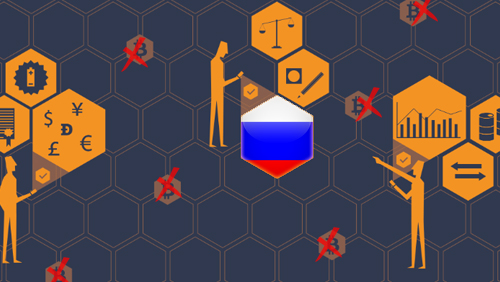In most cases, bitcoin and the blockchain technology go hand in hand. After all, the entire bitcoin network relies on a shared public ledger, which, in turn, is what blockchain is all about. This partnership is accepted globally, but apparently, not in Russia.
 The Ministry of Finance of the Russian Federation has been very vocal in opposing bitcoin, which was outlawed in the country in 2014. In October, Deputy Finance Minister Alexey Moiseev told CoinDesk the country is working on a draft law that will penalize the conversion of digital currencies into the ruble. If passed, anyone caught converting cryptocurrencies to fiat will face up to four years in prison.
The Ministry of Finance of the Russian Federation has been very vocal in opposing bitcoin, which was outlawed in the country in 2014. In October, Deputy Finance Minister Alexey Moiseev told CoinDesk the country is working on a draft law that will penalize the conversion of digital currencies into the ruble. If passed, anyone caught converting cryptocurrencies to fiat will face up to four years in prison.
That being said, Russia’s stance against bitcoin is clear. But what about the underlying technology?
Moiseev, in a separate interview with CoinDesk, sang a different tune: “We feel that blockchain technology is very important in the development of various Internet-based services.”
The technology has Russia’s support, since Moiseev believes it “has potential relevance… for the development of e-commerce.” Bitcoin, on the other hand, will only bring problems to the country.
“Bitcoin themselves, in particular, the implementation of the bitcoin transactions into the real economy, in the real banking system can be very dangerous,” Moiseev told the news outlet.
Thanks to Mark Karpeles, Silk Road, and many other cases, bitcoin is now infamous for bringing trouble. The recent attack on Paris—in which hackers claimed terrorists used bitcoin to fund the attacks—hasn’t helped either, and only sparked renewed debates on the potential of digital currencies to be used for financing terrorism and money laundering. Moiseev said the ministry is concerned bitcoin will only make the country’s financial system even more vulnerable.
“We are very concerned about the potential developments there as we have built serious system of protection against money laundering and financing terrorism using conventional banking system. We are quite afraid of opening this window up by allowing a free convertibility of bitcoins into rubles and back,” he explained, according to CoinDesk.